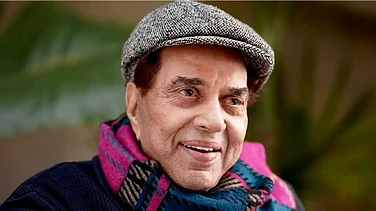Aword in English, a phrase in Hindi, mixed and matched by an ecstatic rhymester. Having a ball with the quill, the average Bollywood lyri-cist has transformed the art ofsongwriting into a chaotic cocktail party. While a viewer walks into a hall, willing tosuspend his disbelief for three hours, the film music listener readily suspends his commonsense for a three-minute-long musical voyage.
The listener is lapping up chutnified language. So the lyricist isdelivering it with glee. In Sexy Sexy from Khuddar, Indivar wrote: Me no worry/ Me no care/ Me go marry millionaire/ If he dies me no cry/ Me go marry another guy..." The song became a major hit. And never mind the lyrics, which had another specimen of crazy word-mongering: "A, B, C, D, One, two, three, four/ Wee Willie Winkie, Jack and Jill." Interestingly, to make a climactic kill, Indivar rhymed Jill with Dil with a frolicsome wrist-twister.
Of course, lyrical frivolity isn’t new to Bombay’s film industry. It was distinctly evident when Amitabh Bachchan, popping out of a giant Easter egg in Amar Akbar Anthony, lip-synched to My name is Anthony Gonzalves.... In Sharaabi a few years later, a song Jahan Char Yaar alternated Hindi with English in a hilarious stanza. The films clicked. So did the songs.
But, the difference: Bachchan was an actor whose every gesture waseulogised by the star-gazing viewer. In the megastar’s scheme of things, music meantlittle andlyrics even less. Moreover, the songwriter’s departures were oddities thatnormally rhymed with the film’s storyline. Some instances: the Usha Uthup number inShalimar, Mithun’s discotheque numbers in Disco Dancer, the Kamal-Rati musical exchanges in Ek Duje Ke Liye. This is quite unlike today when revival of Indian melody might be talked about, but English for English’s sake is often used by the lyricist for no obvious reason.
In the Main Khiladi Tu Anari song performed by Anu Malik and Alisha Chinai, the lyricist Rani Malik went: "My adorable darling/ I think of you every night, every morning..." In Ruk Ruk Ruk from Vijaypath, Tabu lip-synched to Shyam Anuragi’s delirious expressions of love in rhyme, such as "bride" and "suicide". Another inane sequence: "fascination", "invitation", "lamination", "frustration", "lovestation", "reservation" and "examination" at one go. In Dulaara, film star Govinda took off in his guttural voice: Tu ladki kitni cute hai/ Tera face bhhi kitna sweet hai.... The consequence: such songs were superhits, belyingthe claims of those who felt they should have been canned or banned.
While hybridising, even western rock numbers aren’t spared often. Unlikeyester-years when lyrics weren’t usually guillotined, today’s fancyfreesongwriter flicks phrases straight from commonplace cuts in English. In Criminal, thecatchphrase of The Police’s Every Breath You Take was crudely pasted on to aninstrumental interlude. A second Vijaypath number, Ladke Aaj Ke Ladke had an appallingmisuse of The Beatles’ classic Ob-La-Di, Ob-La-Da. Manhandling the song’s name,the lyricist Indivar wrote: You call me bladi/ You call me blada /I know Angrezi /MainLondonwallah.
Another amusing development in modern-day songwriting is the creationof ridiculous abbreviations. In the Hathkadi number LML Baba LML, the lyricist Dev Kohliformulated a couple, L.M.L and G.T.H. The expanded form of L.M.L: Let’s Make Love.And G.T.H: Go to Hell. Far from being a cacophonic flop, the song is among the mostpopular numbers in circulation today.
Popular music mart and quality art—the very fact that they seldomco-exist has engendered this torrent of new songs. The lyricist has become a churner,generating with profligacy phrases like Dabboo ka beer joint/ Hamare love ka meetingpoint. Let alone being looked down upon, such misadventures have contributed to severalmodern cinematic successes. The person responsible for this is the unpredictable Indianlistener, who has often junked potential classics in favour of a fad from the blue. Thecocktail is his latest love, and lyricists are marketing it before their taps of Hinglishcliches run dry.






















